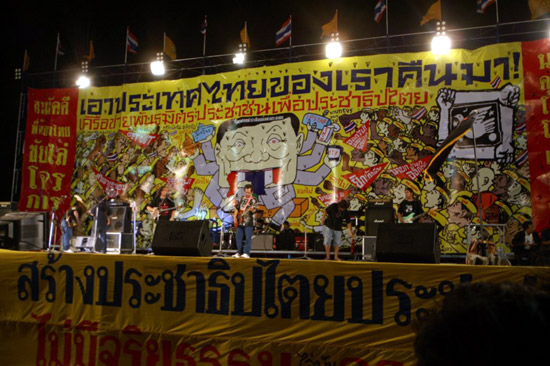Music: Modern Forms
"Contemporary" in Thailand really begins in the 1930s, when court musicians were being eclipsed in popularity by Thai musicians who were taking up jazz, Western classical music, film music, and tango. Pleng Thai sakorn (international Thai music) is a genre of contemporary classical music that blends traditional Thai music elements with the instruments of the Western classical tradition, popularized by composer Eua Sunthornsanan during the 1930s and 1940s. Now the term typically refers to Thai popular music in general.
If luk thung is Thailand’s “country music,” than luk krung is its schmaltzy (and less popular) urban cousin. Violinist Kruh Euah was the first Thai musician to bring luk krung’s ballroom style to prominence with his Suntharaphon band in the 1940s.
String and Beyond
The form known as string describes small pop ensembles that emerged in the 1980s to embrace a variety of styles, at first largely pleng sakorn standards, rock, and reggae. The brothers Asanee and Wasan Chotikul (forming a band called Asanee-Wasan) have been the most popular string act of the last quarter century in Thailand. In 2008, they came out of retirement to do a world tour for the Thai diaspora. Beyond the ubiquitous string genre (and often within it as well), hip-hop, heavy metal, and boy-band pop have also become hugely popular.
Since the late 20th century, luk thung, string, and mor lam artists have been creating crossover music. Because of this trend, luk thung singers have increasingly been promoted like Western pop singers and American boy bands, with the accent on youth and looks over musicality.
Songs of Protest
Pleng chiwit (songs of life) is a form of Thai folk rock that draws from Western folk rock sounds and attitudes that came to prominence in the 1970s, at a time of great change in Thai society. The first democratic government was elected in 1973, and this music was an integral part of ushering in this era. The military coup that occurred three years later was also chronicled through pleng chiwit music by such pioneering bands as Caravan. Other bands of the movement, such as Carabao, were active through the 1980s. In 2006, street protests brought many of these older musicians back to prominence.
Article written for World Trade Press by Matthew Monte.
Copyright © 1993—2025 World Trade Press. All rights reserved.

 Thailand
Thailand 